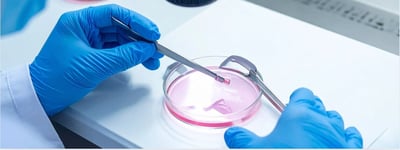.jpg)
November 9, 2022
How to Decide if Donor Route is Right for You
Fertility Counseling: Part 2
We continue our series of blogs about Donor Conception, written by our counsellor Mollie Graneek. To read the first part, please click here.
When faced with the difficulties associated with infertility, we very often push the boundaries we set at the early stages of our fertility journey. This seems to be a normal and accepted part of the process.
When couples fail to conceive naturally they will visit their general practitioner for advice. The advice, quite understandably, is that they should ‘try for a bit longer’ but, after a year, they will investigate by blood tests and scans. Should these tests prove to be normal, prescribed medicines such as clomiphene may be used to cause ovulation in women when ovulation does not naturally occur.
Should conception not occur on this treatment, the general practitioner may suggest further investigations. Depending these results, in vitro fertilization might be offered.
All couples want to achieve pregnancy naturally but, if:
- you have not succeeded in achieving pregnancy either naturally or through IVF;
- you are not producing eggs or sperm;
- your own eggs or sperm are of poor quality and are unlikely to result in pregnancy;
- you have a high risk of passing on a genetic disorder or inherited disease;
- you are in a same-sex relationship;
- you are a single woman,
- you may be faced with the decision to use egg or sperm donation to achieve the family you want.
If donation is suggested then you need to consider some of the complex issues involved in donor conception before embarking upon treatment by consulting a fertility counsellor.
To create families through gamete donation has become commonplace throughout the world and the importance attached to counselling has increased a great deal over the past few years. The HFEA advises that counselling is a key element in the provision of infertility services and the implications should be considered before treatment.
Couples may come for counselling together or, each partner may feel the need to see the counsellor individually. Sometimes acknowledging and talking about painful feelings can be therapeutic. Counselling gives time outside the medical setting to help patients understand treatment options – whether to go ahead with treatment, to stop treatment, to consider alternatives or, to come to terms with childlessness. All patients who are considering treatment with donor sperm or eggs are encouraged by the Human Fertilisation & Embryology Authority (HFEA) to see a counsellor to explore the issues, uncertainties, implications and expectations of having a donor child.
Is Counselling ‘Mandatory’ Before Donor Conception?
Of course it is not; counselling is not practiced in accordance with mandate. Counselling is not practiced in response to compulsory demands but is guided by principles of good practice. These principles in turn are determined largely by textbooks and learned literature, by the experience of counsellors who imparted their advice to those in a position of learning. Nowadays good practice in counselling is determined by ‘guidelines’ published either by the HFEA or the British Infertility Counselling Association (BICA). These do not have the effect of ‘mandate’ and are there for advice and guidance.
Most clinics, however, will impress on patients the importance of counselling before they embark upon treatment especially if they are requesting donor conception and, strongly believe that patients benefit from the knowledge and support of the counselling specialist:
- to enable them to reflect upon and, understand the implications of proposed treatment options;
- to provide emotional support before, during and after treatment;
- to assist in developing coping strategies;
- to provide a safe space for people requesting assisted conception through donation so that they consider the implications of treatment on themselves, their families and, of course more importantly, on the child resulting from donor conception.
To speak with a counsellor, please contact us today.
.jpg?upsize=true&upscale=true&width=400&height=200&name=Untitled%20design%20(1).jpg)

